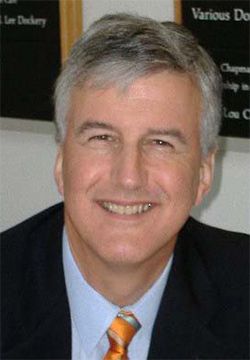William Cance Joins University of Arizona Cancer Center as Deputy Director
William Cance, MD, has recently joined the University of Arizona Cancer Center (UACC) as Deputy Director.
William Cance, MD

William Cance, MD
William Cance, MD, has recently joined the University of Arizona Cancer Center (UACC) as Deputy Director. Cance will lead the UACC efforts in Phoenix at the Dignity Health St. Joseph’s Hospital and Medical Center and play a critical role in the integration of the Tucson and Phoenix campuses, thus developing one center center in two sites, according to a news release from UACC.
Cance, a fellowship-trained surgical oncologist, treats patients with complex gastrointestinal and endocrine cancers, with a particular focus on the diagnosis and treatment of thyroid and parathyroid diseases, including thyroid cancer.
“We are excited to have Dr. Cance join us as the deputy director for the Cancer Center in Phoenix,” said Marcia Gruber-Page, vice president of oncology services at UACC at Dignity Health St. Joseph’s Hospital and Medical Center. “He brings the experience, creativity and leadership that will allow us to integrate the Tucson and Phoenix research programs and to expand the clinical trial and clinical care opportunities for our patients in Phoenix.”
Cance’s research interests focus on focal adhesion kinase (FAK), a promising therapeutic target being evaluated in several clinical trials using kinase enzyme inhibitors. He was the first researcher to clone human FAK in 1993 and demonstrate its overexpression in almost all human cancers.
Some of Cance’s current work is honing in on the biology of FAK and developing anti-cancer drugs that target the signal, according to the release. He also is interested in the role of FAK in integrating cancer cell signaling that enhances the survival mechanisms of cancer cells.
Cance is the principal investigator on a current R01 grant from the National Cancer Institute (NCI) focusing on FAK. He has been awarded numerous other grants from the NCI and National Institutes of Health, as well as the American Cancer Society, Susan G. Komen Breast Cancer Foundation and the U.S. Department of Defense.
“I believe that the partnership between a National Cancer Institute-designated Comprehensive Cancer Center such as the UA Cancer Center and a world-class healthcare organization such as Dignity Health St. Joseph’s will serve to integrate delivery of cancer care and bring new levels of excellence in cancer treatment and prevention to the Phoenix area and across Arizona,” Cance said.
Cance is the former president of the Society of Surgical Oncology, a member of the American Association of Endocrine Surgeons, American Association for Cancer Research, American Surgical Association, Society of Clinical Surgery and American Society of Clinical Oncology, as well as a Fellow of the American College of Surgeons.
Cance received his medical degree from Duke University School of Medicine and was the chief resident in the Department of Surgery at Barnes Hospital Washington University School of Medicine in St. Louis, Missouri. He also completed two fellowships, one in Surgical Oncology at Memorial Sloan-Kettering Cancer Center in New York, and the other in the Departments of Surgery and Microbiology and Immunology at Washington University School of Medicine.
Anticipating Novel Options for the RAI-Refractory DTC Armamentarium
May 15th 2023In season 4, episode 6 of Targeted Talks, Warren Swegal, MD, takes a multidisciplinary look at the RAI-refractory differentiated thyroid cancer treatment landscape, including the research behind 2 promising systemic therapy options.
Listen